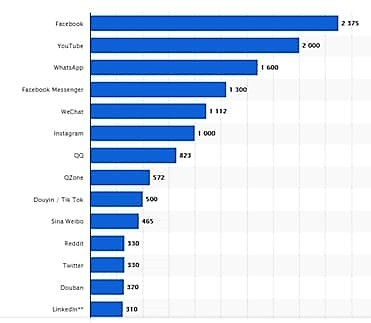Which Social Networks Should You Be On? 🤔
- Blossm Social Media

- Oct 18, 2019
- 2 min read
Updated: Oct 12, 2022
As of 2019, according to Influencer Marketing Hub, there are more than 50 popular social sites that you need to know about varying from Yelp to YouTube to Facebook. So, how do you choose? Shall we put on a blindfold and randomly pick 10 social media networks off a list?

Probably not. There is a better, more strategic way to go through the selection process. Although it’s not as easy as the blindfold method, it will be more valuable and effective for your brand.
Below are the most popular social networks worldwide as of July 2019, ranked by number of active users (in millions) (Statista).
Choosing to focus on the quality of followers over the quantity of followers is imperative for authentic communication with your customers and prospects. Your business does not necessarily have to be active on every social platform, but you should choose the one(s) that align with your company’s objectives and the network your target audience uses.
There are benefits to taking the long-term route to follow your objectives when selecting social platforms. We must go where our customers are and understand the purpose each platform serves.
When social media is done correctly, you can:
• Improve your search engine rankings (SEO)
• Humanize your brandImprove brand loyalty • Provide better customer service
• Create opportunity for higher conversion rates
• Become a thought leader
You have an opportunity to share your story with 42% of the worldwide population through social media (Emarsys).
Here are 3 easy-to-follow steps you can take towards choosing what social networks to say yes to:
1. Identify Your Audience
Who do you serve and/or whom do you want to serve? Research the demographics of your typical customers i.e. age, gender, location, income, education level, etc.Bonus tip: Check out what platforms your competition is on.
2. Create Objectives
After identifying your audience, you need to determine your goals. Are you looking to engage with your customers, increase brand recognition, use it as an outlet for customer service?
3. Find Your Tribe
Where are your clients? Analyze step one’s results (demographics) and now look at social media platform demographics to see where your customers are and how they are using the network.





Comments